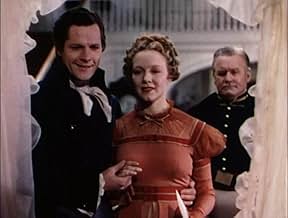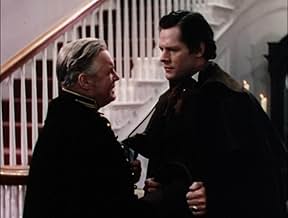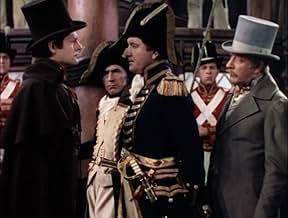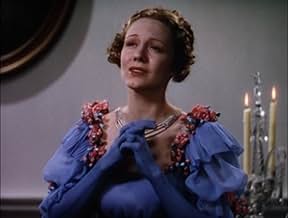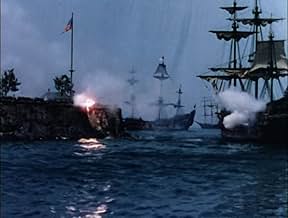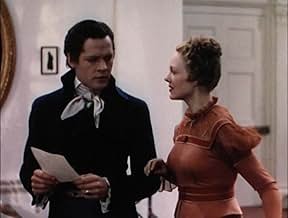Füge eine Handlung in deiner Sprache hinzuThis historical featurette dramatizes the events that led to Francis Scott Key writing the words to "The Star-Spangled Banner."This historical featurette dramatizes the events that led to Francis Scott Key writing the words to "The Star-Spangled Banner."This historical featurette dramatizes the events that led to Francis Scott Key writing the words to "The Star-Spangled Banner."
George Beranger
- Capt. Smyth
- (Nicht genannt)
Glen Cavender
- Pianist
- (Nicht genannt)
Jack A. Goodrich
- Party Guest
- (Nicht genannt)
Julia Griffith
- Party Guest
- (Nicht genannt)
Gordon Hart
- Dr. William Beanes
- (Nicht genannt)
Stuart Holmes
- Capt. Montrose
- (Nicht genannt)
William McClain
- Colored Servant
- (Nicht genannt)
Ferdinand Schumann-Heink
- Lieutenant
- (Nicht genannt)
Lottie Williams
- Party Guest
- (Nicht genannt)
Empfohlene Bewertungen
Our national anthem may not be the prettiest in the world but, if this short film is to be believed, it is definitely the dullest in its origins. Rarely has 27 minutes felt so long. Decent soporific for unruly 8th graders, though.
Here's another of the 1930s Warner Brothers Technicolor shorts. After having looked at a bunch of them, I have concluded that they are technical masterpieces, intended to show off and be sold to theaters on the basis of the beauty of 1930s Technicolor. It certainly succeeds on that count.
What I find annoying is the vapid and ludicrous story of how Francis Scott Key wrote the words to "The Star-Spangled Banner,' with the actors reciting rather than singing the words, because everyone knows that it can't be sung unless you either have a three-octave range, or everyone in the crowd is so drunk that no one cares. This is an inheritance of the song the music is stolen from, an old drinking song "To Anacreon in Heaven."
Anyway, it's pretty to look at if you can find a good print like that which runs on Turner Classic Movies.
What I find annoying is the vapid and ludicrous story of how Francis Scott Key wrote the words to "The Star-Spangled Banner,' with the actors reciting rather than singing the words, because everyone knows that it can't be sung unless you either have a three-octave range, or everyone in the crowd is so drunk that no one cares. This is an inheritance of the song the music is stolen from, an old drinking song "To Anacreon in Heaven."
Anyway, it's pretty to look at if you can find a good print like that which runs on Turner Classic Movies.
It's the origin story of Francis Scott Key writing "The Star-Spangled Banner." He boards the H. M. S. Surprise to gain the freedom of Dr. William Beanes. On the British ship, he witnesses the heroics of Fort McHenry under British bombardment and gains inspiration to write the iconic poem which is the lyrics to the song. This is mostly very bland history with a couple of minutes of miniature action. The worst is him coming up with the words to the poem. It's all very sincere and stale.
Song of a Nation, The (1936)
** 1/2 (out of 4)
Warner character actor Donald Woods stars in this Technicolor short and has him playing Francis Scott Key, the man who would write The Star-Spangled Banner. In the film we see his early views of the war and how he would eventually be inspired to write the song. I'm really not sure how historically accurate this thing is but fans of the Golden Age will certainly want to give this one a shot as the Technicolor is pretty impressive and makes this worth seeing. Fans of Woods will also like seeing him here in a pretty good role that has him turning in a fine performance. The ending has the actor "thinking" out the words to the song as he writes them and I thought Woods did a pretty good job here even if it was handled a bit tacky by the director. If you know the events surrounding how the song was written then you're not going to learn too much here. The Technicolor is what really sticks out even if the print shown by TCM was in pretty rough shape at certain spots.
** 1/2 (out of 4)
Warner character actor Donald Woods stars in this Technicolor short and has him playing Francis Scott Key, the man who would write The Star-Spangled Banner. In the film we see his early views of the war and how he would eventually be inspired to write the song. I'm really not sure how historically accurate this thing is but fans of the Golden Age will certainly want to give this one a shot as the Technicolor is pretty impressive and makes this worth seeing. Fans of Woods will also like seeing him here in a pretty good role that has him turning in a fine performance. The ending has the actor "thinking" out the words to the song as he writes them and I thought Woods did a pretty good job here even if it was handled a bit tacky by the director. If you know the events surrounding how the song was written then you're not going to learn too much here. The Technicolor is what really sticks out even if the print shown by TCM was in pretty rough shape at certain spots.
OK, given the choice I prefer the "Drunk History" episode about the origins of "The Star Spangled Banner" (especially the part when Francis Scott Key picks up an iPhone to call his friends and tell them about his poem).
">????????
(Sorry. My cat Naomi has her own opinion on this.) But I really enjoy the pretty-colored Technicolor American history shorts produced by Warner Brothers in the late 1930s. This is no exception. Even knowing all the problems and strife, even knowing that the tune is that of a drinking song that contains a few words we did not hear in a Hollywood movie until the late '60s, it's lovely to look at and even kind of inspiring.
">????????
(Sorry. My cat Naomi has her own opinion on this.) But I really enjoy the pretty-colored Technicolor American history shorts produced by Warner Brothers in the late 1930s. This is no exception. Even knowing all the problems and strife, even knowing that the tune is that of a drinking song that contains a few words we did not hear in a Hollywood movie until the late '60s, it's lovely to look at and even kind of inspiring.
Wusstest du schon
- WissenswertesThe copyright date under the main title reads MCMXLVII which is 1947, identifying the print as from the 1947 re-release.
- VerbindungenEdited into March On, America! (1942)
Top-Auswahl
Melde dich zum Bewerten an und greife auf die Watchlist für personalisierte Empfehlungen zu.
Details
- Erscheinungsdatum
- Herkunftsland
- Sprache
- Auch bekannt als
- Broadway Brevities (1935-1936 season) #29: Song of a Nation
- Drehorte
- Produktionsfirma
- Weitere beteiligte Unternehmen bei IMDbPro anzeigen
- Laufzeit18 Minuten
- Seitenverhältnis
- 1.37 : 1
Zu dieser Seite beitragen
Bearbeitung vorschlagen oder fehlenden Inhalt hinzufügen

